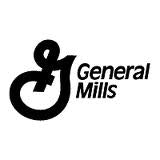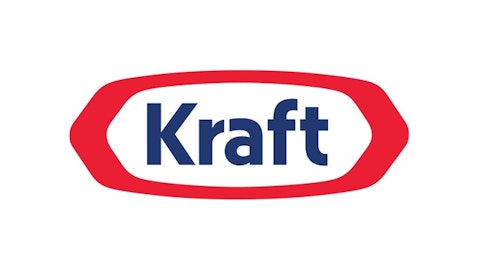The Consumer Defensive sector offers plenty of opportunities for dividend-seeking investors. Characterized by low volatility in its earnings and quite predictable growth paths, this is a choice for the risk-averse. The packaged foods industry, in particular, is one of the most predictable, while at the same time committed with sustainable growth and dividend payouts. Within this segment, I will look into three behemoths: General Mills, Inc. (NYSE:GIS), Kraft Foods Group Inc (NASDAQ:KRFT), and Kellogg Company (NYSE:K), in order to elucidate if they stand strong as income investments.
Based on history
General Mills, Inc. (NYSE:GIS) has a market capitalization of $33 billion and holds some of the best-known brands in the food industry around the world. Its wide portfolio comprises 25 categories, including market-share-leading brands like Cheerios, Betty Crocker, and Pillsbury, among many others. This extensive offering, combined with a strong global footprint, provides the firm with a fair economic moat that will help keep competitors at bay and the company growing.

Trading at 18.5 times its earnings, slightly below the industry average, while holding compelling growth prospects and paying out a 2.94% dividend yield, this is definitely a stock to add to your long-term income portfolio, especially if you are looking for low volatility and a steady flow of cash.
Krafting income
Kraft Foods Group Inc (NASDAQ:KRFT) is even larger than General Mills, Inc. (NYSE:GIS), with a market cap of almost $35 billion. Its portfolio comprises several popular international brands. Some of them, like Kraft and Oscar Mayer, are worth over $1 billion, and another 25 of its brands generate over $100 million in annual sales.
The management’s constant focus on innovation, brand building, cost control, and productivity improvements should enhance long-term returns for the company. However, just like in the case of General Mills, Inc. (NYSE:GIS), the real appeal for Kraft Foods Group Inc (NASDAQ:KRFT) shareholders stems from its dividend policy. Returns and payout ratios are decent, making this a safe bet from an income investment point of view. Although its dividend policy has been somewhat inconsistent in the past, “the company aims to balance growth and reinvestments, going ahead. Kraft will focus on cash generation and deliver consistent shareholder returns through strong financial discipline” (Zacks). Actually, projections predict free cash flow will represent about 85% of the net income in the longer term, being mostly allocated toward rewarding stockholders, rather than widening the firm’s margins.
A company that satisfies Warren Buffet’s criteria for investing, which trades at 21.5 times its earnings (very close to the industry average), a PEG ratio of 2.9, and offers one of the highest dividend yields in the industry at 3.43%, is certainly one to buy and hold.
Good for your health, but not so much for your portfolio
Kellogg Company (NYSE:K) is primarily known for its ready-to-eat cereals, but also markets snacks and convenience foods. With a market cap of $24 billion, it is the smallest of all three firms analyzed here. However, it trades at the highest valuation, 26.5 times its earnings, which is a 32% premium to the industry average.
Although its portfolio comprises several worldwide leading brands (including Special K, Frosted Flakes, Corn Flakes, Froot Loops, and even Pringles, acquired from Procter & Gamble about a year ago) and the management maintains a strong focus on constant innovation, brand building, international expansion, and cost control, I’d recommend staying away from this stock at the time.
After missing consensus estimates, mainly due to the high pressure exerted on its margins by rising raw material and labor prices, along with weak demand in its European segment, Kellogg Company (NYSE:K)’s future looks uncertain and the sustainability of its dividend policy is questionable. Other concerns revolve around rising distribution costs, packaging, and promotional and advertising campaigns. Moreover, its large international exposure makes it particularly susceptible to currency fluctuations.
In addition, the Pringles acquisition may prove difficult to integrate and could divert management’s focus from its main goal of correcting past mistakes, mainly associated with under-investing and supply chain issues.
Keeping an eye on a company as large and as moated as Kellogg Company (NYSE:K) might not be a bad idea.
Bottom line
Although all three companies described above hold sustainable growth prospects and pay out juicy dividends. I’d recommend only adding General Mills, Inc. (NYSE:GIS) and Kraft Foods Group Inc (NASDAQ:KRFT) to your income portfolio, while staying away from Kellogg Company (NYSE:K). Buy, hold, and prepare to perceive regular dividends that will help you support your everyday expenses.
The article 3 Packaged Foods Stocks for Your Income Portfolio originally appeared on Fool.com and is written by Victor Selva.
Victor Selva has no position in any stocks mentioned. The Motley Fool has no position in any of the stocks mentioned. Victor is a member of The Motley Fool Blog Network — entries represent the personal opinion of the blogger and are not formally edited.
Copyright © 1995 – 2013 The Motley Fool, LLC. All rights reserved. The Motley Fool has a disclosure policy.



